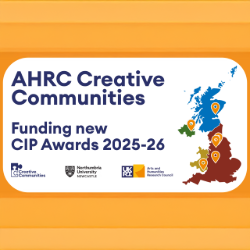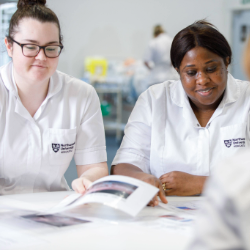-
Study
-
Undergraduate
- UCAS Clearing & Confirmation 2025
- Application Guides
- UCAS Exhibitions
- Extended Degrees
- School & College Outreach
- Information for Parents
-
Postgraduate
- Application Guide
- Postgraduate Research Degrees
- Flexible Learning
- Change Direction
- Register your Interest
-
Student Life
- Students' Union
- The Hub - Student Blog
- Accommodation
- Northumbria Sport
- Support for Students
-
Learning Experience
- Real-World Learning
- Research-enriched learning
- Graduate Futures
- The Business Clinic
- Study Abroad
-
-
International
International
Northumbria’s global footprint touches every continent across the world, through our global partnerships across 17 institutions in 10 countries, to our 277,000 strong alumni community and 150 recruitment partners – we prepare our students for the challenges of tomorrow. Discover more about how to join Northumbria’s global family or our partnerships.
View our Global Footprint-
Quick Links
- Course Search
- Undergraduate Study
- Postgraduate Study
- Information for Parents
- London Campus
- Northumbria Pathway
- Cost of Living
- Sign up for Information
-
International Students
- Information for International Students
- International Events
- Application Guide
- Entry Requirements and Education Country Agents
- Global Offices
- English Requirements
- English Language Centre
- International student support
- Cost of Living
-
International Fees and Funding
- International Undergraduate Fees
- International Undergraduate Funding
- International Masters Fees
- International Masters Funding
- International Postgraduate Research Fees
- International Postgraduate Research Funding
-
International Partners
- Agent and Representatives Network
- Global Partnerships
- Global Community
-
International Mobility
- Study Abroad
- Information for Incoming Exchange Students
-
-
Business
Business
The world is changing faster than ever before. The future is there to be won by organisations who find ways to turn today's possibilities into tomorrows competitive edge. In a connected world, collaboration can be the key to success.
More on our Business Services -
Research
Research
Northumbria is a research-rich, business-focused, professional university with a global reputation for academic quality. We conduct ground-breaking research that is responsive to the science & technology, health & well being, economic and social and arts & cultural needs for the communities
Discover more about our Research-
Quick Links
- Research Peaks of Excellence
- Academic Departments
- Research Staff
- Postgraduate Research Studentships
- Research Events
-
Research at Northumbria
- Interdisciplinary Research Themes
- Research Impact
- REF
- Partners and Collaborators
-
Support for Researchers
- Research and Innovation Services Staff
- Researcher Development and Training
- Ethics, Integrity, and Trusted Research
- University Library
- Vice Chancellors Fellows
-
Research Degrees
- Postgraduate Research Overview
- Doctoral Training Partnerships and Centres
- Academic Departments
-
Research Culture
- Research Culture
- Research Culture Action Plan
- Concordats and Commitments
-
-
About Us
-
About Northumbria
- Our Strategy
- Our Staff
- Our Schools
- Place and Partnerships
- Leadership & Governance
- University Services
- History of Northumbria
- Contact us
- Online Shop
-
-
Alumni
Alumni
Northumbria University is renowned for the calibre of its business-ready graduates. Our alumni network has over 250,000 graduates based in 178 countries worldwide in a range of sectors, our alumni are making a real impact on the world.
Our Alumni - Work For Us
What will I learn on this module?
This year-long practice module develops essential skills, values, and competencies for nursing associates, guided by the NMC Code (2018) and the NMC (2024) Standards of proficiency for nursing associates. It emphasises a patient-centered, reflective, and evidence-based approach to care, enabling you to develop your skills in using research and guidelines to make informed clinical decisions. Reflection models, such as those by Gibbs and Kolb, are integrated to support your continuous self-assessment and growth.
Core NMC principles, including respect, compassion, and prioritising people, are central, with a focus on maintaining patient dignity and well-being. You will understand the role of people who use service users and carers (PUSC) feedback to improve care quality. Training in comprehensive nursing assessments highlights their importance in identifying patient needs and guiding effective care plans.
The module also stresses compassion, individuality, and advocacy for equitable access, preparing you to make reasonable adjustments for inclusive care. Safety is emphasised, with best practices consistently applied to protect patients across all care settings.
Innovative digital resources, such as SCRIPT and online learning packages (OSLs), support learning. Completion of all mandatory training is required before clinical placements, including basic life support, moving and handling, infection prevention and control, and the Oliver McGowan training on learning disability and autism.
You will learn to develop your electronic Practice Assessment Document (ePAD) and reflect on your personal and professional growth through coaching skills. This module emphasises the importance of family- and patient-centered care, as well as recovery-focused approaches, encouraging you to reflect on feedback from PUSC during placements. These foundational skills mark the beginning of your journey as an evidence-based practitioner.
How will I learn on this module?
Module teaching will be delivered via a range of strategies. At university you will engage in peer group seminars and have access to the BlackBoard Ultra, where you will find a range of learning materials such as PowerPoint presentations, Panopto recordings, videos, workbooks, and digital educational resources. In addition, you will spend 50% of your programme in practice placements developing and consolidating your learning.
You will be empowered to become an independent learner through engagement with an evolving curriculum meeting the needs of individuals and families through innovation and the delivery of best practice. You will be expected to engage in self-directed study that help construct knowledge in preparation for you to become a dynamic, safe and caring professional.
In practice you will learn under the supervision of practice supervisors and practice assessors, who will support you to engage in learning opportunities that will enable you to achieve NMC (2024) Standards of proficiency for nursing associates.
Your learning environment, both in university and practice, will provide you with the opportunity to understand the theoretical background and rationale behind the practice you experience on your practice placement. This will be enhanced by developing your clinical and reflective skills linking theory and practice.
How will I be supported academically on this module?
Within this module there will be a close collaboration between the university and practice placement areas to provide you with a robust supportive network. You will be supported by your practice supervisor, practice assessor, academic assessor, practice learning tutors (PLT) and the module team to continue your professional development throughout the first year of your nursing associate programme.
You will be allocated a personal tutor, who will meet with you regularly to provide appropriate pastoral support and sign post you to relevant academic guidance. You will be encouraged to access BlackBoard Ultra, where you will find a range of learning materials to support you with module learning and formative/summative assessments. You will be able to contact the module team in person, by email or phone and through the module page on BlackBoard Ultra. Skills Plus, the University Library’s collection of online learning materials can be used to support the development of your academic skills. You will also support each other via peer support, through engaging in discussion and debate to enhance your learning. Additional relevant materials, including the electronic reading list and other teaching and learning methods will be available via BlackBoard Ultra and library services. The University Libraries at both Coach Lane Campus and City Campus offer an extensive collection of material, both hard copy and electronic, access to international databases and training in information retrieval. All support will be in line with any Student Accessibility Plan (SAP).
The student support and wellbeing service at Northumbria are excellent points of contact for assistance with queries regarding disability, faith, counselling, mental health support, finance, and welfare issues. You can access these services via email on your student portal, by telephone or through the ask4help desk staff based within university libraries. Further details of practice support can be found via the relevant link in the appropriate section of your programme handbook which is located on BlackBoard Ultra.
What will I be expected to read on this module?
All modules at Northumbria include a range of reading materials that students are expected to engage with. The reading list for this module can be found at: http://readinglists.northumbria.ac.uk
(Reading List service online guide for academic staff this containing contact details for the Reading List team – http://library.northumbria.ac.uk/readinglists)
What will I be expected to achieve?
Knowledge & Understanding:
1. Recognise and discuss evidence and research that underpins your clinical practice.
2. Understand the importance of self-reflection and be able to apply established models of reflection to your clinical practice.
3. Recognise the key platforms from the NMC The Code: Standards of professional practice for nurses, midwives and nursing associates including prioritising people and be able to discuss the importance of PUSC feedback.
Intellectual / Professional skills & abilities:
4. Develop an awareness of your own limitations, applying evidence to perform a range of fundamental practical skills in a safe and effective way.
5. Identify the impact of an effective nursing assessment on the health, wellbeing and safety of patients and clients.
6. Develop a knowledge and understanding of medicine calculations, management, and administration relevant to the role of the registered nursing associate.
Personal Values Attributes (Global / Cultural awareness, Ethics, Curiosity) (PVA):
7. Value curiosity, reflect on personal values and develop your professional role and identity in accordance with the NMC Code (2018).
8. Demonstrate the ability to ensure practice is delivered in a compassionate, respectful way maintaining dignity and wellbeing for all service users and their carers through promoting individuality, independence, rights, choice, and inclusion.
9. Demonstrate competence in consistently maintaining patient safety across all settings using appropriate evidence and guidance.
10. Be an advocate, when required, facilitating equitable access to healthcare making necessary reasonable adjustments to the assessment planning and delivery of patient care.
How will I be assessed?
You will be continuously supervised in your practice placements; this will generate feedback for your assessments.
Formative Assessment
You will undertake a variety of assessments, identified in the nursing associate electronic Practice Assessment Document (ePAD), which include episodes of care, medication assessments, written reflections and service user/patient feedback which will feed into the summative assessment.
At the end of your practice placement, you will reflect on your practice development and review your progress with your practice supervisor and practice assessor.
(MLO’s 1 - 10)
Summative Assessment
Pass/Fail – In the final practice placement of year one, following feedback from your practice supervisors, your practice assessor and academic assessor will assess you against the proficiencies an evidence in the ePAD (MLO’s 1 - 10)
Pre-requisite(s)
N/A
Co-requisite(s)
N/A
Module abstract
This comprehensive, year-long module provides nursing associates with essential skills, values, and competencies, aligned with the NMC Code (2018) and NMC (2024) Standards of proficiency for nursing associates. Emphasising a patient-centered, reflective, and evidence-based approach, the module supports skill development in using research and guidelines to make sound clinical decisions. Reflection models, such as Gibbs and Kolb, are embedded to facilitate continuous self-assessment and professional growth.
Core principles include respect, compassion, and prioritising people, with a strong focus on patient dignity and the role of PUSC feedback to enhance care quality. You will receive training in comprehensive nursing assessments, essential for addressing patient needs and delivering effective care plans.
Supported by digital resources like SCRIPT and online learning packages, this module integrates mandatory training in life support, moving and handling, and infection control and Oliver McGowan training. Through ePAD development and coaching-based self-reflection, you will gain foundational skills for becoming competent, compassionate, evidence-based practitioner.
Course info
UCAS Code B780
Credits 40
Level of Study Undergraduate
Mode of Study 2 years Full Time
Department Nursing, Midwifery & Health
Location Coach Lane Campus, Northumbria University
City Newcastle
Start September 2026
All information is accurate at the time of sharing.
Full time Courses are primarily delivered via on-campus face to face learning but could include elements of online learning. Most courses run as planned and as promoted on our website and via our marketing materials, but if there are any substantial changes (as determined by the Competition and Markets Authority) to a course or there is the potential that course may be withdrawn, we will notify all affected applicants as soon as possible with advice and guidance regarding their options. It is also important to be aware that optional modules listed on course pages may be subject to change depending on uptake numbers each year.
Contact time is subject to increase or decrease in line with possible restrictions imposed by the government or the University in the interest of maintaining the health and safety and wellbeing of students, staff, and visitors if this is deemed necessary in future.
Useful Links
Find out about our distinctive approach at
www.northumbria.ac.uk/exp
Admissions Terms and Conditions
northumbria.ac.uk/terms
Fees and Funding
northumbria.ac.uk/fees
Admissions Policy
northumbria.ac.uk/adpolicy
Admissions Complaints Policy
northumbria.ac.uk/complaints








